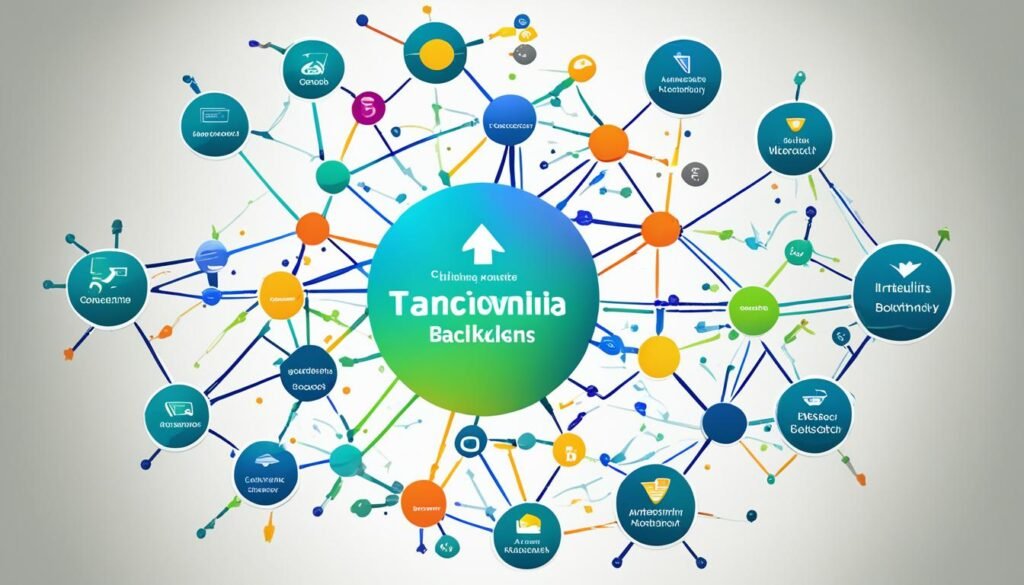Blogging for business is a powerful marketing tactic that can bring numerous benefits to your brand. In today’s digital age, with almost 4 billion internet users worldwide, blogging is a key tool for businesses to elevate their online visibility and achieve sustained growth.
Key Takeaways: Blogging For Business
- Blogging for business helps drive traffic to your website.
- It allows you to repurpose blog content for social media, increasing your brand’s reach.
- Blogging assists in converting website traffic into leads.
- Consistently creating valuable content establishes authority in your industry.
- It helps with link building, improving your search engine rankings.
Driving Traffic to Your Website
https://www.youtube.com/watch?v=xzAReEff7TE
Blogging plays a crucial role in driving website traffic and optimizing your online presence. By regularly creating and publishing blog posts, you increase the chances of your website showing up in organic search results, attracting new visitors who are actively searching for keywords related to your business. This organic search traffic, also known as website traffic, is invaluable for expanding your online reach and generating potential leads.
When you publish a blog post, it becomes an indexed page on your website. This means that search engines like Google will crawl and index the content, making it visible in search results when relevant keywords are searched. The more indexed pages you have, the greater the chance of your website appearing in organic search results, driving more traffic to your site.
Optimizing your blog posts with search engine optimization (SEO) techniques further boosts their visibility on the search engine results page (SERP). By using relevant keywords throughout your blog post’s content, title, headings, and meta descriptions, you can enhance their ranking for those specific keywords, making it easier for users to find your website through organic search.
In addition, by regularly updating your blog with fresh and valuable content, you send signals to search engines that your website is active and should be frequently crawled. This helps improve your website’s overall visibility on the SERP and increases the chances of attracting more organic search traffic.
By driving more organic search traffic to your website through blogging, you can reach a wider audience and increase your brand exposure. It’s a cost-effective strategy to attract potential customers who are actively seeking information or products related to your industry, increasing the likelihood of conversion and ultimately driving business growth.
Next, let’s explore how you can repurpose the content from your blog posts to expand your online presence on social media and attract a broader audience.
Repurposing Blog Content for Social Media

Blogging for your business not only helps with website traffic but also provides content that can be shared on social media platforms. Each blog post serves as an opportunity to engage your audience on social networks like Twitter, LinkedIn, Facebook, and Pinterest. By sharing your blog content on these platforms, you can attract new followers and increase brand exposure. Repurposing blog content for social media marketing is a cost-effective way to promote your business and keep your social media presence active.
Social media platforms have become integral for businesses to connect with their target audience and build brand awareness. By repurposing your blog content, you can maximize its reach and impact on social media. Sharing blog posts on platforms like Facebook and LinkedIn allows you to reach a wider audience and gain valuable social reach. Each social media share not only provides an opportunity for your followers to engage with the content but also introduces your brand to potential new followers.
When repurposing your blog content for social media, it’s important to consider the platform and its specific audience. For example, Twitter requires concise and catchy headlines, while LinkedIn lends itself to more in-depth discussions. By tailoring your content to each platform, you can increase its shareability and effectiveness in capturing the attention of your target audience.
Content Sharing Strategies
- Create social media posts that highlight key points or quotes from your blog post along with an eye-catching image. This allows you to capture the interest of your audience and entice them to click through to read the full article.
- Consider creating visually appealing infographics or videos based on your blog content. These formats are highly shareable and can help amplify your message on social media.
- Engage with your audience by asking questions or encouraging them to share their thoughts and opinions on the topic discussed in your blog post. This fosters social interaction and increases the visibility of your content.
When repurposing your blog content, be sure to include social media sharing buttons on your blog to make it easy for readers to share your content with their own networks. Additionally, monitor the performance of your social media posts and analyze which ones resonate most with your audience. This data can inform your future content creation and repurposing strategies, helping you optimize your social media presence and drive more traffic back to your blog.
| Social Media Platform | Benefits for Blog Promotion |
|---|---|
| Opportunity to share quick updates, engage in real-time conversations, and reach a large and diverse audience. | |
| Platform for professional networking, establishing thought leadership, and reaching a business-oriented audience. | |
| Massive user base, ability to target specific demographics, and share in-depth content with a wide range of users. | |
| Visual platform that allows you to showcase images and graphics related to your blog content, attracting users interested in visual inspiration and ideas. |
By repurposing your blog content for social media, you can extend the reach of your brand, increase engagement with your audience, and drive more traffic to your website. This cost-effective strategy allows you to leverage the power of social media for blog promotion and ultimately achieve your business goals.
Converting Traffic into Leads

One of the key benefits of blogging for business is the opportunity to convert website traffic into leads. When website visitors land on your blog, you have the chance to guide them through the customer journey and encourage them to take the next step.
By strategically incorporating compelling call-to-action buttons throughout your blog posts, you can motivate visitors to engage further with your brand. These calls-to-action prompt them to take specific actions that can lead to valuable conversions.
For instance, you can offer free resources such as ebooks, webinars, or trials in exchange for the visitor’s information. This allows you to generate leads and capture essential data that can be used for lead nurturing and follow-up.
Optimizing your blog for lead generation involves creating enticing calls-to-action that are relevant to the content of your blog post. Whether it’s encouraging readers to subscribe to your newsletter, request a demo, or sign up for a free trial, a well-placed call-to-action can significantly increase your conversion rate.
It’s important to consider the design and placement of your call-to-action buttons. They should be visually appealing, stand out from the rest of the content, and be strategically positioned to catch the reader’s attention. Additionally, make sure your call-to-action buttons are mobile-friendly, as an increasing number of website visitors browse on mobile devices.
“By adding compelling call-to-action buttons to every blog post, you can guide visitors towards taking the next step in their customer journey.”
In addition to call-to-action buttons within the blog post itself, you can also use a landing page specifically designed to convert visitors into leads. A landing page is a standalone web page that offers a focused, relevant offer and minimizes distractions. It allows you to provide more information about the value of your offer and capture the visitor’s information through a lead capture form.
By optimizing your blog for lead generation and incorporating compelling call-to-action buttons and landing pages, you can effectively convert website traffic into valuable leads. These leads can then be nurtured through targeted marketing efforts, ultimately increasing the likelihood of converting them into paying customers.
| Landing Page Benefits | Conversion Rate Optimization | Lead Generation Strategies |
|---|---|---|
| 1. Provides a focused, relevant offer | 1. Use compelling and visually appealing call-to-action buttons | 1. Offer free resources in exchange for visitor’s information |
| 2. Minimizes distractions for better conversion rates | 2. Strategically position call-to-action buttons for maximum visibility | 2. Create landing pages with lead capture forms |
| 3. Enables targeted marketing efforts | 3. Optimize call-to-action buttons for mobile devices | 3. Nurture leads through email marketing and personalized content |
Establishing Authority in Your Industry

In today’s competitive business landscape, establishing authority in your industry is crucial for attracting and retaining customers. By consistently creating valuable content through blogging, you have the opportunity to position yourself as an industry leader and a thought leader in your field.
One of the key benefits of blogging is that it allows you to address common questions and provide insights that demonstrate your expertise. By sharing your knowledge and expertise through valuable content, you become a trusted source of information for your target audience.
When you consistently produce high-quality blog posts that offer solutions to your customers’ pain points, you build customer trust and credibility. By showcasing your industry knowledge and expertise, you naturally become the go-to resource for your target audience, further solidifying your position as an authority.
Being perceived as an industry leader and a thought leader not only enhances your brand reputation but also increases customer trust. When customers trust your brand, they are more likely to choose your products or services over your competitors’. Trust is a crucial factor in establishing long-term and loyal customer relationships.
Blogging also allows you to promote your brand values and showcase your unique expertise in your industry. By consistently conveying your brand’s voice and values through your content, you not only differentiate yourself from your competitors but also attract customers who align with your brand’s values.
“Blogging allows you to amplify your expertise and demonstrate your industry leadership. By sharing valuable content, you establish trust with your audience and position your brand as the go-to resource.”
Overall, investing in blogging and consistently delivering valuable content can help you establish authority in your industry, gain customer trust, and position your brand as an industry and thought leader. By showcasing your expertise and offering valuable insights, you can attract and retain customers, ultimately driving the success of your business.
Building Backlinks for SEO

Blogging is not just about creating valuable content for your audience—it’s also a powerful tool for building backlinks and improving your search engine rankings. Inbound links, also known as backlinks, play a crucial role in enhancing your website’s domain authority and credibility.
“Inbound links from authoritative websites serve as a vote of confidence and recommendation for your brand.”
When other companies and industry leaders link to your blog content, it demonstrates that your website is a trustworthy source of information and an expert in your industry. This can significantly impact your search engine visibility and organic search rankings.
By consistently creating high-quality and relevant content, you increase the chances of attracting relevant backlinks from reputable sources. These inbound links not only drive referral traffic but also indicate to search engines that your website is a credible resource worth ranking higher.
Domain Authority and Search Engine Ranking
Your domain authority, a metric developed by Moz, reflects the overall credibility of your website. It is influenced by various factors, including the quantity and quality of your backlinks.
Here’s how building backlinks through blogging can boost your domain authority and search engine ranking:
- Increased Referral Traffic: When reputable websites link to your blog content, it not only improves your website’s credibility but also generates traffic from visitors who click on those backlinks.
- Improved Search Engine Visibility: Search engines, such as Google, consider backlinks as signals of trust and authority. By attracting backlinks from relevant and high-quality websites, you increase the chances of ranking higher in search engine result pages (SERPs).
- Enhanced Domain Authority: As you accumulate authoritative backlinks over time, your website’s domain authority improves. A higher domain authority leads to more favorable search engine rankings and increased organic visibility.
Building backlinks through blogging requires a strategic approach. Focus on creating valuable content that naturally attracts attention and compels others to link to it. Collaborating with industry influencers, contributing to reputable publications, and participating in guest blogging opportunities can also help you earn valuable backlinks.
| SEO Benefit | Description |
|---|---|
| Inbound Links | Links from other websites to your content |
| Backlinks | Hyperlinks that point to your website from external sources |
| Domain Authority | A metric that predicts a website’s search engine ranking |
| Search Engine Ranking | The position of a website in search engine results |
| Credibility | The trustworthiness and expertise associated with a website |
By incorporating a solid backlink strategy into your blogging efforts, you can greatly enhance your website’s credibility, search engine rankings, and overall online presence.
Driving Long-Term Results

Blogging is a long-term strategy that delivers ongoing results. While some blog posts may generate immediate traffic and leads, others can continue to drive results for months or even years to come. This compounding effect allows you to reach a wider audience and generate more leads over time.
One key aspect of driving long-term results is through the creation of compounding posts. These are blog posts that continue to gain traction and generate traffic long after they are published. They are typically comprehensive, in-depth articles that provide valuable insights and information to readers. By focusing on creating compounding posts that cover evergreen topics, you can ensure that your blog continues to attract visitors and generate leads over an extended period.
Creating Evergreen Content
Evergreen content refers to articles and blog posts that remain relevant and valuable to readers over time. Unlike timely or trend-driven content, evergreen content focuses on providing timeless information that addresses common pain points and queries of your target audience. By regularly creating and promoting evergreen content, you can ensure that your blog remains a valuable resource for your readers, driving consistent traffic and attracting new visitors.
An effective strategy for monetizing your blog is through sales enablement. By aligning your blog content with your products or services, you can educate your audience on their benefits and how they address their pain points. Incorporate relevant product links, case studies, and customer testimonials within your blog posts to guide readers towards purchasing decisions and generate sales.
Leveraging Blog Analytics
To optimize your blogging strategy for maximum impact, it is important to leverage blog analytics. These insights provide valuable data on the performance of your blog posts, allowing you to identify which articles are driving the most traffic and engagement. By analyzing blog metrics such as page views, click-through rates, and time on page, you can make data-driven decisions to improve your content strategy and focus on producing blog posts that resonate with your audience.
Table: Key Blog Analytics Metrics
| Metric | Description |
|---|---|
| Page Views | The total number of times a blog post has been viewed |
| Click-through Rate (CTR) | The percentage of readers who clicked on a link or call-to-action within a blog post |
| Time on Page | The average amount of time readers spend on a blog post before navigating away |
By consistently tracking and analyzing these metrics, you can gain valuable insights into the performance of your blog and make informed decisions to optimize your content strategy for long-term success.
Networking and Brand Awareness

Blogging offers more than just a platform to share valuable content; it also opens up networking opportunities and helps increase brand awareness. By establishing and maintaining a well-run blog, your brand can attract collaborations with industry influencers and related brands, leading to valuable partnerships and increased visibility.
One effective way to enhance your brand’s authority and reach new audiences is through guest blogging. By contributing guest posts to established platforms within your industry, you can showcase your thought leadership and expertise to a wider audience. This allows you to tap into new networking opportunities and build valuable connections with other professionals in your field.
Additionally, conducting interviews with industry leaders and featuring them on your blog can further enhance your brand’s credibility and thought leadership. These interviews provide valuable insights and perspectives for your audience, while also strengthening your relationships with influential figures in your industry.
Around-up posts, where you compile expert opinions or advice from various industry influencers, can also be a powerful networking tool. By quoting and featuring these experts in your blog, you not only provide valuable content for your readers but also encourage them to share the post, expanding your brand’s reach and attracting new followers.
| Benefits of Networking and Brand Awareness | Influencer Partnerships | Brand Exposure |
|---|---|---|
| Expand your professional network and forge valuable connections | Collaborate with influential figures in your industry | Reach new audiences and increase brand visibility |
| Learn from industry experts and gain insights | Benefit from the credibility and authority of influencers | establish lasting relationships with customers and industry peers |
| Discover new opportunities for collaboration and growth | Enhance your own brand’s thought leadership and expertise | Build trust and establish your brand as a leader in the field |
Furthermore, a blog provides a platform for you to communicate directly with your customers and address their concerns. When you engage with your audience through the comment section of your blog or on social media, you not only build customer relationships but also cultivate a loyal following. This active communication fosters trust and loyalty, enabling your brand to thrive in a competitive market.
Don’t forget to share your blog posts on social media platforms to maximize your brand exposure. By leveraging the credibility gained from blogging, you can significantly boost your brand’s reach and attract new followers. The combination of valuable content and active social media promotion creates a powerful synergy that drives brand awareness and establishes your position as a thought leader in your industry.
Networking and brand awareness go hand in hand when it comes to building a successful brand. By leveraging your blog as a networking tool, you can connect with industry influencers, establish thought leadership, and increase your brand exposure. Through partnerships, guest blogging, interviews, and establishing a strong social media presence, your blog can become a powerful asset in expanding your network and raising awareness of your brand among your target audience.
Also Read : Master The Art Of Lifestyle Blogging: Tips And Tricks For Success
Conclusion
Blogging for business offers numerous benefits that can elevate your brand’s online presence. By consistently creating valuable content and engaging with your audience, you can position your brand as an industry leader. This helps establish authority and trust with your customers, enabling you to generate leads and improve search engine rankings.
Investing in blogging as part of your marketing strategy creates long-term results. Whether you’re a small business or an established company, blogging can lead to sustained business growth and success. By driving traffic to your website and consistently creating valuable content, you can build strong customer relationships and achieve your business goals.
So, seize the opportunity and embrace blogging as a powerful tool for your brand. Start creating valuable content, engaging with your audience, and reaping the benefits of increased online visibility, authority, leads, and long-term success. Take the first step towards sustained business growth and unlock the immense potential of blogging for your business.
FAQs
Q: What are the benefits of starting a business blog?
A: Starting a business blog can help increase your online presence, attract more customers, and establish your business as an authority in your industry.
Q: How can business blogging help my marketing strategy?
A: Business blogging can improve your website’s SEO, drive more traffic to your site, and generate leads for your business.
Q: Why is quality content important for a business blog?
A: Quality content is important for a business blog as it helps engage your audience, build credibility, and improve your website’s search engine rankings.
Q: What role do keywords play in business blogging?
A: Keywords are crucial in business blogging as they help optimize your content for search engines, attract relevant traffic, and improve your website’s visibility online.
Q: How can I make my business blog successful?
A: To make your business blog successful, focus on creating valuable and relevant content, engage with your audience, and promote your blog through various channels.
Q: What are some best practices for businesses that are new to blogging?
A: Some best practices for new business bloggers include conducting keyword research, developing a content calendar, and actively promoting your blog on social media and other platforms.
Q: How does blogging help small business owners?
A: Blogging can help small business owners increase brand awareness, connect with their target audience, and drive more traffic to their websites, leading to potential growth for their business.
Source Links
- https://blog.hubspot.com/marketing/the-benefits-of-business-blogging-ht
- https://mailchimp.com/resources/benefits-of-blogging-for-business/
- https://www.forbes.com/sites/forbesbusinesscouncil/2021/04/28/eight-reasons-blogging-is-a-worthwhile-investment-for-businesses/





